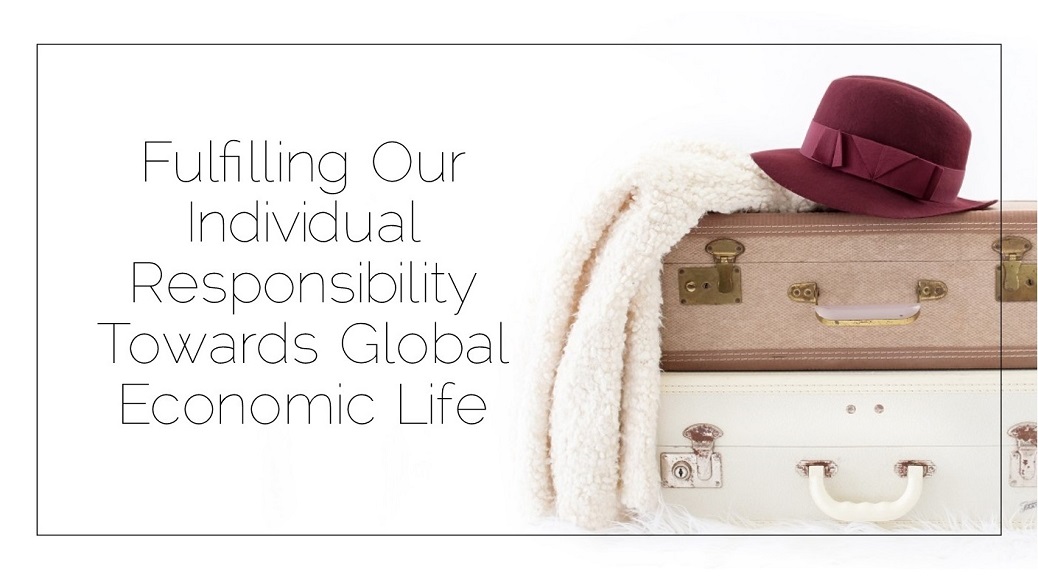There is an exciting discourse gaining increasing momentum online: how to use what the world has to give us—food, clothes, stuff—to live a better life, rather than living life to collect increasing amounts of food, clothes, and stuff. There is the minimalist movement, the sharing economy, the buy local movement, and, of course, efforts to increase fair trade.
I write a lot about the power that we have, as consumers, to effect change, one shopping trip at a time. That’s because on the one hand, it’s just that important, and on the other hand, there is that much power in our collective hands that goes unused. By reducing the number of things we buy, we have more money to spend on items that are more socially conscious. And while no company is perfect, some are less evil than others—and ultimately, it’s the process of reflecting on where to put our money that matters the most.
The trace that our economic choices leaves behind
I recently read how every choice we make, “as employee or employer, producer or consumer, borrower or lender, benefactor or beneficiary—leaves a trace, and the moral duty to lead a coherent life demands that one’s economic decisions be in accordance with lofty ideals, that the purity of one’s aims be matched by the purity of one’s actions to fulfil those aims.” This isn’t something new; I know that a lot of people around me have, for sometimes very long periods of time, wondered how they can align their personal belief in things like justice and respect of the environment with their actions as consumers.
One thing that really helps is to think of ourselves first as spiritual, noble beings, and then as consumers. What does it mean, to be a spiritual, noble being? What are the implications of being such a person on our day-to-day life? And what are the implications of this on the contents of our carts?
The implications of just one spiritual principle
If we believe, for example, in letting our hearts “burn with loving-kindness for all who may cross our paths”, how do we apply this principle at the grocery store? How are we kind to ourselves and our budgets but at the same time, be kind to those working to bring food to us? Buying local and buying fair trade are two immediate and obvious answers, but what if there are other options as well?
Similarly, if we want our hearts to burn with this loving-kindness, should we be flying cheap airlines? When we do so, what are we supporting? In other words, why are our tickets so cheap? Is it because the airline has cut wages dramatically? And in a related line of thought, what are the consequences of us flying all over the world just to see things with our own eyes—is it worth the cost to the environment? Is going to a resort worth the environmental and social justice cost of what these companies did to get the prime beach location in the first place?
Final Thoughts
There are a lot of questions to ask ourselves, and an incredible number of opportunities to put our money where our beliefs stand. This is great news, that should bring us all a lot of joy: there is a lot we can do, and as we do it, even more opportunities present themselves to us. How empowering is that!


So many questions and so many reflections to be had at an individual level but also at the community level. I think it’s important to start asking those questions and having a conversation with those around us to figure out what we are comfortable with doing (and not doing) within our own worlds. I think this will look very different for each person but as long as we continuously try to improve and really delve deep to observe and reflect our lifestyle, that’s what’s important!
Also, as we take the initial steps, we realise that we have the capacity and willingness to do a lot more than we originally thought!
I must admit that I am greatly influenced by the world around me in the consumer choices I make. I will not shop anywhere that exploits its employees or its producers.
You are wonderful, Michal! Do you by any chance have a list of places you never shop at to share?
I love this! I think it’s about time we realize the planet has enough resources to cover our basic needs not our greed. Thank you for sharing 🙂
Love how you put it! Yes, totally, basic needs but not our greed–it would make sure a good tagline for a campaign. Well done–and thank you for sharing as well!